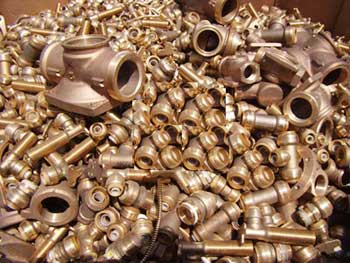How to Identify and Recycle Valuable Scrap Metals
Wiki Article

Identifying valuable scrap metals can be a game-changer for anyone looking to recycle. Metals like copper, brass, and aluminum are in high demand and can fetch good prices when recycled. Knowing how to identify these metals and separate them from less valuable materials can make a big difference in your recycling efforts. Simple tools like a magnet can help you distinguish between ferrous (magnetic) and non-ferrous (non-magnetic) metals, aiding in proper sorting.
Identifying Valuable Scrap Metals
One of the first steps in maximizing the value of your scrap metal is knowing how to identify different types of metals. Copper, for example, is often found in electrical wires, plumbing pipes, and air conditioning units. Its distinctive reddish-brown color and non-magnetic properties make it easy to identify. Brass, which is a combination of copper and zinc, is commonly used in fixtures, fittings, and decorative items and can be identified by its yellowish-gold color. Aluminum, another valuable metal, is lightweight and commonly found in beverage cans, window frames, and car parts. Using a magnet is a simple way to distinguish between ferrous and non-ferrous metals, with non-ferrous metals typically being more valuable.
Sorting and Preparing Scrap Metals
Properly sorting your scrap metals before taking them to a
recycling facility can significantly increase the price you receive. Separating metals by type and removing any non-metallic materials, such as plastic or rubber, ensures that your scrap is in the best possible condition for recycling. For example, stripping insulation from copper wires can increase their value. Similarly, separating brass fittings from other types of metal can help you get a better price. Taking the time to sort and clean your scrap metal not only maximizes its value but also streamlines the recycling process, making it more efficient and effective.
Sydney's Advanced Recycling Facilities
Sydney's recycling centers offer services and resources to help you identify and recycle your scrap metals effectively. These facilities are equipped with advanced technologies to process and repurpose scrap metals, ensuring that they are reused and not wasted. By taking your sorted and cleaned scrap metals to these facilities, you can maximize your returns while contributing to a more sustainable recycling ecosystem.
Recycling centers in Sydney are committed to promoting environmental conservation and resource recovery, making it easier for individuals and businesses to participate in sustainable practices.
Conclusion
Identifying and properly sorting valuable scrap metals is essential for maximizing your recycling efforts. By understanding the properties of different metals and taking the time to clean and separate them, you can ensure that you receive the highest possible price for your scrap. Sydney's advanced recycling facilities provide the resources and services needed to turn your scrap into valuable assets, supporting a sustainable and environmentally-friendly approach to waste management. For more information on how to recycle your scrap metals effectively and to explore recycling options, visit
Sydneycopper.com.au.
Report this wiki page
